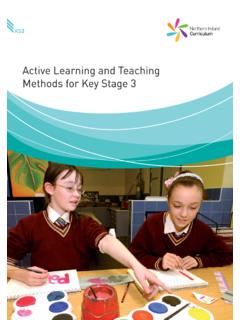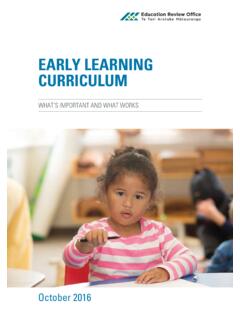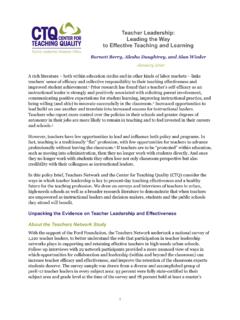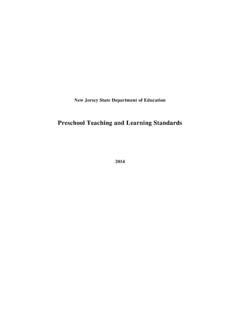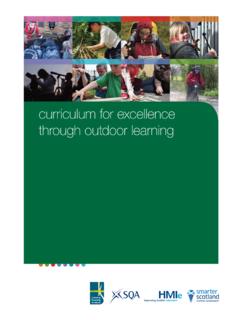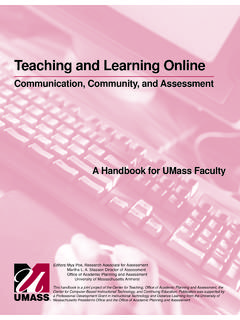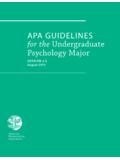Transcription of Curriculum development module
1 Curriculum design and development Author: Judy McKimm MBA, MA (Ed), BA (Hons), Cert Ed, ILTM Head of Curriculum development , School of Medicine Imperial College Centre for Educational development This paper was first written in 2003 as part of a project led by the London Deanery to provide a web-based learning resource to support the educational development for clinical teachers. It was revised by Judy McKimm in 2007 with the introduction of the Deanery s new web-based learning package for clinical teachers. Each of the papers provides a summary and background reading on a core topic in clinical education.
2 Aims This paper: Provides an overview of the main concepts involved in course design and planning Raises awareness of factors which contribute to effective learning Enables you to incorporate educational theory into everyday practice Learning outcomes After studying this paper, you will be able to: Describe approaches to Curriculum development and design Plan a course or session using an outcome based approach Write learning objectives/outcomes which communicate the intended learning to students and others Recognise factors which contribute to effective teaching and learning in your own practice Outline implications of Curriculum change Select appropriate strategies in changing a Curriculum for your profession Make a more effective contribution towards Curriculum design Content Introduction Curriculum
3 development an introduction Course design and planning the broad context Curriculum development strategies and models - strategies of Curriculum development - objectives model - process model - models of Curriculum development The elements of the Curriculum : - aims and learning outcomes - content - teaching and learning methods - assessment - learning resources Implementing the Curriculum Monitoring and evaluating the Curriculum References Further reading Introduction This paper is designed to provide clinical teachers with some of the background theory relating to Curriculum design and course development , highlighting some of the main approaches and recent trends in medical and healthcare education.
4 This paper is designed to be studied alongside Teaching and Learning in the clinical context. As with most activities in education, Curriculum development is not carried out in isolation from other activities, but is part of an iterative planning, development , implementation and review cycle. It should be noted that the term can be used to describe development at different levels: large-scale curricular reform (eg. the national review of undergraduate medical education which was carried out by all UK medical schools between 1993 1996 or the introduction of the Foundation Curriculum ), modification of existing programmes or making simple changes to one s own lessons.
5 However, the same principles apply in a range of contexts and to both large and small-scale activities. Some forms of educational development include Curriculum development although usually educational development refers to any kind of development activity in an educational context. Curriculum development an introduction The word Curriculum derives from the Latin currere meaning to run . This implies that one of the functions of a Curriculum is to provide a template or design which enables learning to take place.
6 Curricula usually define the learning that is expected to take place during a course or programme of study in terms of knowledge, skills and attitudes, they should specify the main teaching, learning and assessment methods and provide an indication of the learning resources required to support the effective delivery of the course. A Curriculum is more than a syllabus. A syllabus describes the content of a programme and can be seen as one part of a Curriculum . Most curricula are not developed from scratch and all operate within organisational and societal constraints.
7 The Curriculum that is written and published, for example as course documentation, is the official or formal Curriculum . The aim of educational development is to ensure that the official Curriculum is delivered as the functional Curriculum and there is not a mismatch as development turns into implementation. The official Curriculum can also be distinguished from the hidden, unofficial or counter Curriculum . Paul Willis work on the sociology of schooling for example describes how the informal pupil group comprising working class lads has its own sub-culture and counter Curriculum which involves mucking about , doing nothing and having a laff (Willis, 1977, pp62-63).
8 The hidden Curriculum describes those aspects of the educational environment and student learning (such as values and expectations that students acquire as a result of going through an educational process) which are not formally or explicitly stated but which relate to the culture and ethos of an organisation. This highlights that the process of learning is as important as its product and as teachers we need to be aware of both the formal and informal factors which impact on learning. Further reading If you are interested in the anthropological or sociological aspects which underpin learning in medical education then you may find reading two very different accounts of medical school training fascinating.
9 The classic study of medical undergraduates is Howard Becker et al s Boys in White (1961) and for a more recent study Simon Sinclair s book Making doctors: an institutional apprenticeship (1997) is an account of undergraduate medical education at University College London (UCL). It covers aspects of official and unofficial life in medical school, focussing on the acquisition and transmission of knowledge, power and hierarchy, gender and race issues and how the students deal with the Curriculum and their various clinical experiences.
10 Learning activity and reflection Thinking about your undergraduate education, can you list some examples of the formal Curriculum ? And some examples of the hidden or unofficial Curriculum ? Are there any instances where these may conflict and impact on learning? My thoughts Some examples of the formal Curriculum might include the prospectus, course guides, lecturers handouts etc. And of the unofficial Curriculum might include Freshers week, rugby and other sports clubs and events, treating female or Asian students differently, the different tribes and territories found in different specialties eg.



